Unit 1 Festivals around the world Reading 教学设计-公开课-优质课(人教必修3精品)
- 格式:doc
- 大小:45.00 KB
- 文档页数:3
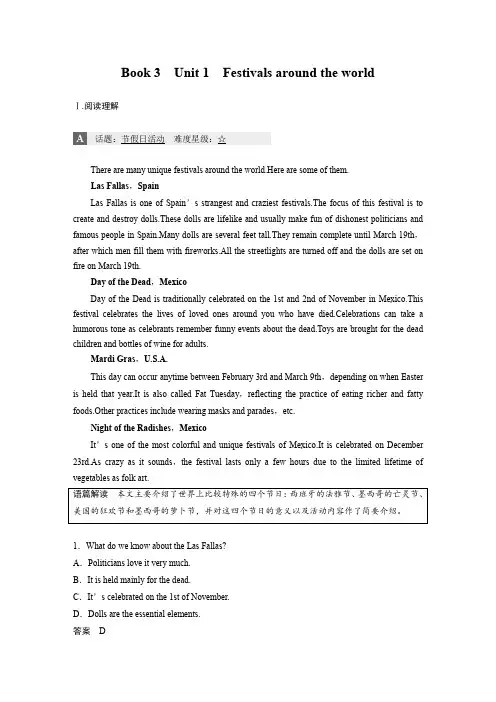
Book 3Unit 1Festivals around the worldⅠ.阅读理解话题:节假日活动难度星级:☆There are many unique festivals around the world.Here are some of them.Las Fallas,SpainLas Fallas is one of Spain’s strangest and craziest festivals.The focus of this festival is to create and destroy dolls.These dolls are lifelike and usually make fun of dishonest politicians and famous people in Spain.Many dolls are several feet tall.They remain complete until March 19th,after which men fill them with fireworks.All the streetlights are turned off and the dolls are set on fire on March 19th.Day of the Dead,MexicoDay of the Dead is traditionally celebrated on the 1st and 2nd of November in Mexico.This festival celebrates the lives of loved ones around you who have died.Celebrations can take a humorous tone as celebrants remember funny events about the dead.Toys are brought for the dead children and bottles of wine for adults.Mardi Gras,U.S.A.This day can occur anytime between February 3rd and March 9th,depending on when Easter is held that year.It is also called Fat Tuesday,reflecting the practice of eating richer and fatty foods.Other practices include wearing masks and parades,etc.Night of the Radishes,MexicoIt’s one of the most colorful and unique festivals of Mexico.It is celebrated on December 23rd.As crazy as it sounds,the festival lasts only a few hours due to the limited lifetime of vegetables as folk art.语篇解读本文主要介绍了世界上比较特殊的四个节日:西班牙的法雅节、墨西哥的亡灵节、美国的狂欢节和墨西哥的萝卜节,并对这四个节日的意义以及活动内容作了简要介绍。
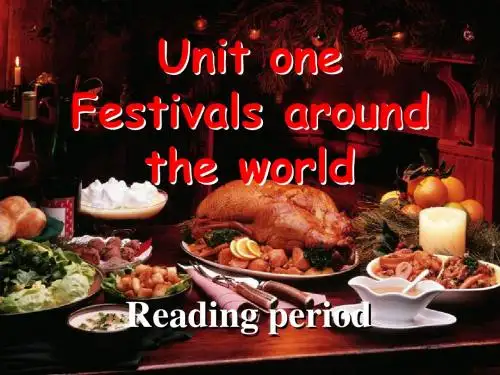
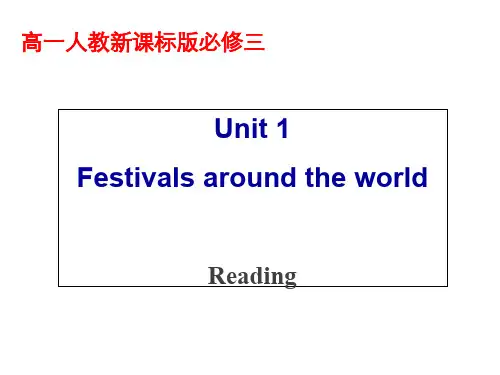
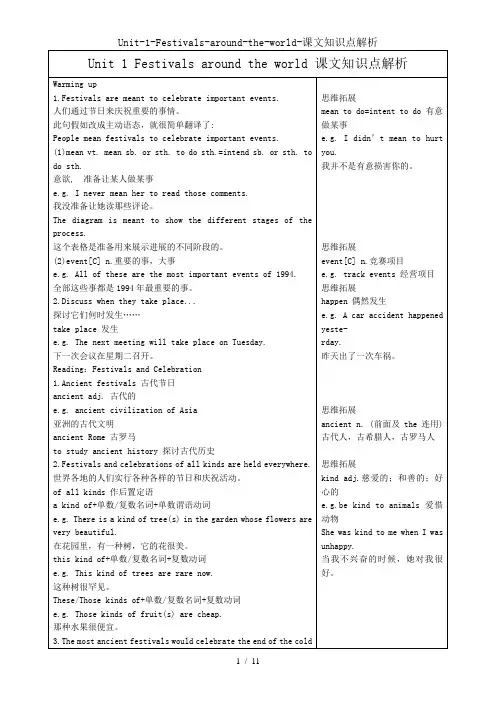
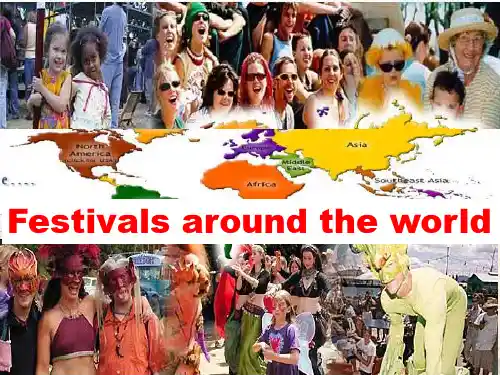
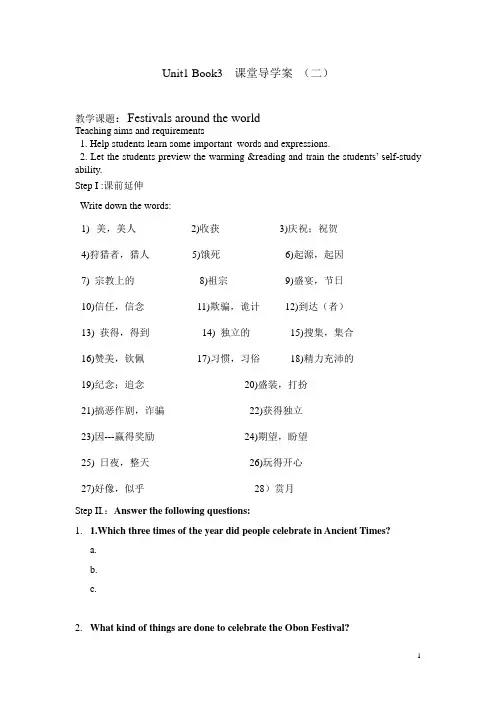
Unit1 Book3 课堂导学案(二)教学课题:Festivals around the worldTeaching aims and requirements1. Help students learn some important words and expressions.2. Let the students preview the warming &reading and train the stude nts’ self-study ability.Step I :课前延伸Write down the words:1)美,美人_______ 2)收获_________ 3)庆祝;祝贺________4)狩猎者,猎人________ 5)饿死___________ 6)起源,起因___________7) 宗教上的__________ 8)祖宗___________ 9)盛宴,节日_____________ 10)信任,信念__________ 11)欺骗,诡计_____12)到达(者)____________ 13) 获得,得到__________ 14) 独立的________15)搜集,集合___________ 16)赞美,钦佩__________ 17)习惯,习俗______18)精力充沛的_________ 19)纪念;追念_____________ 20)盛装,打扮____________21)搞恶作剧,诈骗_______________ 22)获得独立________23)因---赢得奖励______________ 24)期望,盼望__________25) 日夜,整天_______________ 26)玩得开心___________27)好像,似乎_______________ 28)赏月______________Step II.:Answer the following questions:1. 1.Which three times of the year did people celebrate in Ancient Times?a._________________________________________b.__________________________________________c.__________________________________________2.What kind of things are done to celebrate the Obon Festival?______________________________________________________.3. Why does Indian have a national festival on October 2?__________________________________________________________.4. How do Europeans celebrate Thanksgiving festivals?________________________________________________________.5. Name three things people do at Spring Festival.a. ________________________b.________________________c. ________________________Step III合作探究:Read the text carefully and finish the exercises on page3.Step III 课后延伸:Translation1.People love to get together to eat, drink and have fun with each other.——————————————————————————. 2.风筝会每四年举行一次。
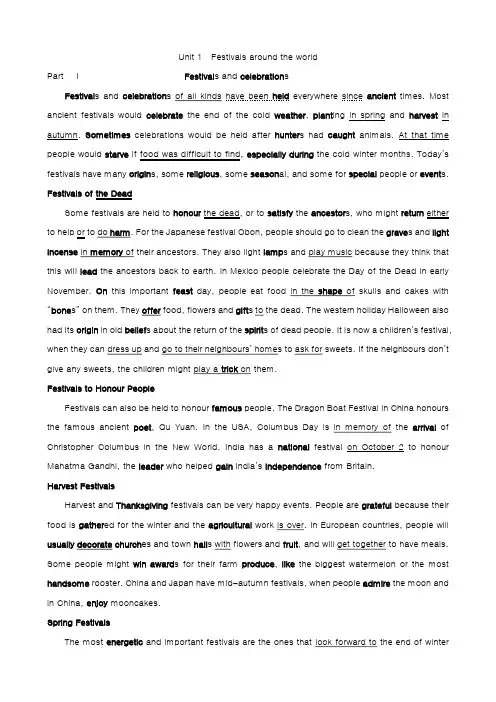
Unit 1 Festivals around the worldPart I Festival s and celebration sFestival s and celebration s of all kinds have been held everywhere since ancient times. Most ancient festivals would celebrate the end of the cold weather, plant ing in spring and harvest in autumn. Sometimes celebrations would be held after hunter s had caught animals. At that time people would starve if food was difficult to find, especially during the cold winter months. Today’s festivals have many origin s, some religious, some season al, and some for special people or event s. Festivals of the DeadSome festivals are held to honour the dead, or to satisfy the ancestor s, who might return either to help or to do harm. For the Japanese festival Obon, people should go to clean the grave s and light incense in memory of their ancestors. They also light lamp s and play music because they think that this will lead the ancestors back to earth. In Mexico people celebrate the Day of the Dead in early November. On this important feast day, people eat food in the shape of skulls and cakes with “bone s” on them. They offer food, flowers and gift s to the dead. The western holiday Halloween also had its origin in old belief s about the return of the spirit s of dead people. It is now a children’s festival, when they can dress up and go to their neighbours’ homes to ask for sweets. If the neighbours don’t give any sweets, the children might play a trick on them.Festivals to Honour PeopleFestivals can also be held to honour famous people. The Dragon Boat Festival in China honours the famous ancient poet, Qu Yuan. In the USA, Columbus Day is in memory of the arrival of Christopher Columbus in the New World. India has a national festival on October 2 to honour Mahatma Gandhi, the leader who helped gain India’s independence from Britain.Harvest FestivalsHarvest and Thanksgiving festivals can be very happy events. People are grateful because their food is gather ed for the winter and the agricultural work is over. In European countries, people will usually decorate church es and town hall s with flowers and fruit, and will get together to have meals. Some people might win award s for their farm produce, like the biggest watermelon or the most handsome rooster. China and Japan have mid-autumn festivals, when people admire the moon and in China, enjoy mooncakes.Spring FestivalsThe most energetic and important festivals are the ones that look forward to the end of winterand to the coming of spring. At the Spring Festival in China, people eat dumplings, fish and meat, and may give children lucky money in red paper. There are dragon dances and carnival s, and families celebrate the lunar New Year together. Some Western countries have very exciting carnivals, which take place forty days before Easter, usually in February. They might include parades, dancing in the streets day and night, loud music and colourful clothing of all kinds. Easter is an important religious and social festival for Christians around the world. It celebrates the return of Jesus from the dead and the coming of spring and new life. Japan’s Cherry Blossom Festival happens a little later. The country, covered with cherry tree flowers, looks as though it is covered with pink snow.People love to get together to eat, drink and have fun with each other. Festivals let us enjoy life, be proud of our custom s and forget our work for a little while.Part II a sad love storyLi Fang was heart-broken. It was Valentine’s Day and Hu Jin had said she would meet him at the coffee shop after work. But she didn’t turn up. She could be with her friends right now laughing at him. She said she would be there at seven o’clock, and he thought she would keep her word. He had looked forward to meeting her all day, and now he was alone with his roses and chocolates, like a fool. Well, he was not going to hold his breath for her to apologize. He would drown his sad ness in coffee.It was obvious that the manager of the coffee shop was waiting for Li Fang to leave —he wipe d the tables, then sat down and turned on the TV —just what Li Fang needed! A sad Chinese story about lost love.The granddaughter of the Goddess of Heaven visited the earth. Her name was Zhinu, the weaving girl. While she was on earth she met the herd boy Niulang and they fell in love. (“Just like me and Hu Jin,” thought Li Fang.) They got married secretly, and they were very happy. (“We could be like that, ” thought Li Fang.) When the Goddess of Heaven knew that her granddaughter was married to a human, she became very angry and made the weaving girl return to Heaven. Niulang tried to follow her, but the river of stars, the Milky Way, stop ped him. Finding that Zhinu was heart-broken, her grandmother finally decided to let the couple cross the Milky Way to meet once a year. Magpies make a bridge of their wing s so the couple can cross the river to meet on the seventh lunar month. People in China hope that the weather will be fine on that day, because if it is raining, it mean s that Zhinu is weep ing and the couple won’t be able to meet.The announcer said, “This is the story of Qiqiao Festival. When foreigner s hear about the story, they call it a Chinese Valentine’s story. It’s a fine day today, so I hope you can all meet the one you love.’’As Li Fang set off for home, he thought, “I guess Hu Jin doesn’t love me. I’ll just throw these flowers and chocolates away. I don’t want them to remind me of her.’’ So he did.As he sadly pass ed the tea shop on the corner on his way home, he heard a voice calling him. There was Hu Jin waving at him and calling, “Why are you so late? I’ve been waiting for you for a long time! And I have a gift for you!”What would he do? He had thrown away her Valentine gifts! She would never forgive him. This would not be a happy Valentine’s Day!。
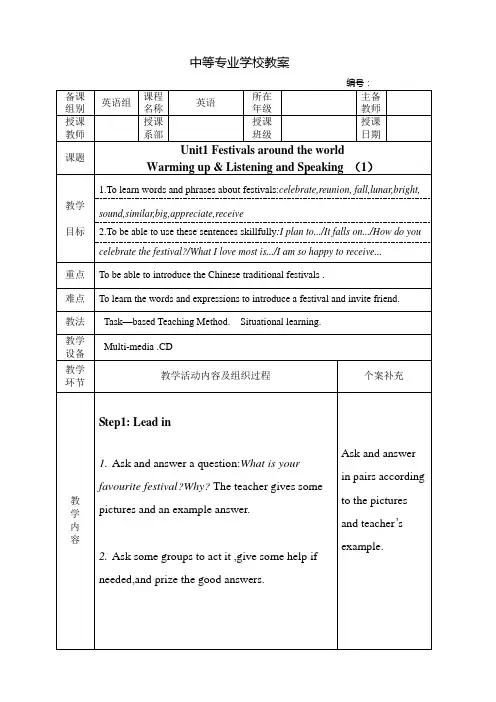
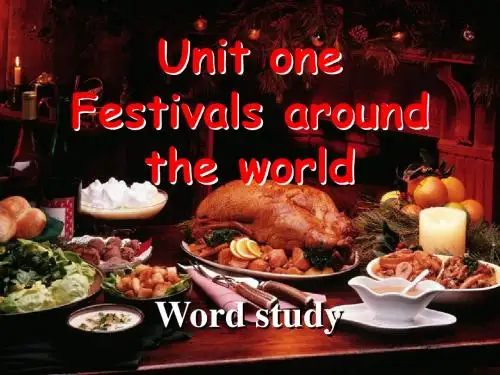
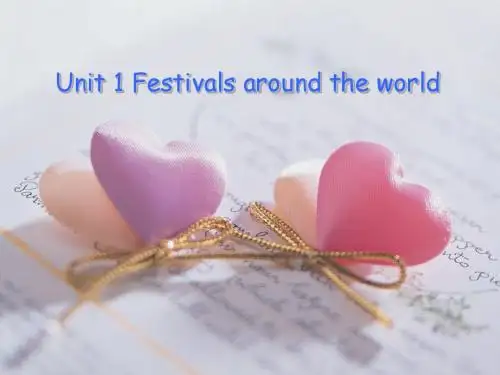
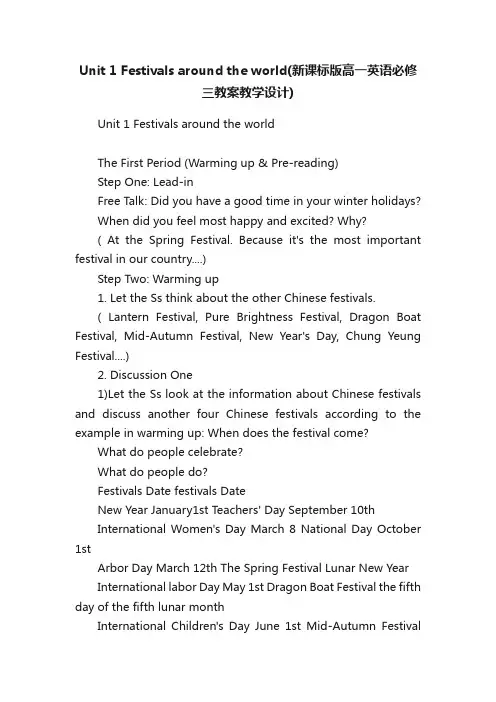
Unit 1 Festivals around the world(新课标版高一英语必修三教案教学设计)Unit 1 Festivals around the worldThe First Period (Warming up & Pre-reading)Step One: Lead-inFree Talk: Did you have a good time in your winter holidays?When did you feel most happy and excited? Why?( At the Spring Festival. Because it's the most important festival in our country....)Step Two: Warming up1. Let the Ss think about the other Chinese festivals.( Lantern Festival, Pure Brightness Festival, Dragon Boat Festival, Mid-Autumn Festival, New Year's Day, Chung Yeung Festival....)2. Discussion One1)Let the Ss look at the information about Chinese festivals and discuss another four Chinese festivals according to the example in warming up: When does the festival come?What do people celebrate?What do people do?Festivals Date festivals DateNew Year January1st Teachers' Day September 10thInternational Women's Day March 8 National Day October 1stArbor Day March 12th The Spring Festival Lunar New Year International labor Day May 1st Dragon Boat Festival the fifth day of the fifth lunar monthInternational Children's Day June 1st Mid-Autumn Festivalthe 15th day of the 8th lunar monthArmy Day August 1st Lantern Festival the 15th day of the 1st lunar monthChinese Youth Day May 4th Pure Brightness Day April the fifth2) Let the Ss fill in the form in the warming up and ask some to share their opinions with the whole class.3 Discussion TwoTalk about some foreign festivals.( Christmas, April Fools Day, Easter Day, Halloween, Valentine's Day, Thanksgiving Day, Obon...)Step three: Pre-readingLet students think about the questions:1) What is your favourate holiday of the year? Why?2)What festivals or celebrations do you enjoy in your city or town? Do you like spending festivals with your family or with friends? What part of a festival do you like best- the music, the things to see, the visits or the food?Step Four: Language Points1.mean to do 打算做某事mean doing 意味着….I never meant him to work for us.Passing the entrance examination means being admitted into college.2. celebrate vt.(1) do sth to show that a day or an event is important 庆祝;祝贺celebrate Christmas / one’s birthday / a wedding anniversary / a victory(2) praise and honor 赞扬;称颂The names of many heroes are celebrated by the poets.词语辨析:celebrate, congratulatecelebrate后常接日期、事情或场合。
Unit 1 Festivals around the world李仕才一、阅读理解Friendship is one of the basic bonds between human beings. While the characteristics of friendship might vary from one country to another, people from all cultures not only enjoy friends but need them.Many studies have shown that teenagers who have no friends often suffer from psychological disorders. It has been shown that teenagers, perhaps more than any other age group, need companionship and a sense of belonging. The negative consequences of loneliness have also been observed among the elderly. The death of a spouse often leaves a widow or a widower totally bereft. If, however, they are surrounded by friends and relatives and if they are able to express their feelings, they are more likely to recover from their grief.“No man is an island.〞 In other words, we are all parts of society. We all need the love, admiration, respect and moral support of other people. If we are fortunate, our friends will provide us with all of these necessary aspects of life.As most people observe, there are many levels of friendship. The degree or intensity of friendship varies depending on the personality of the individuals involved and the context of the relationships. Outgoing persons enjoy being surrounded by many people whereas shy persons are perhaps content with fewer but more intense friendships.Everyone is not equally open with all their friends. The degree of closeness is determined by many factors. Close friends can be formed at any stage in one’s life but they are usually very rare. Not very many people have more than a few really close friends. Regardless of the level of closeness, all friendships are based on reciprocity (互惠), honesty and a certain amount of love and affection.1.Who are more likely to suffer from psychological disorders without friends?A.Teenagers.B.Adults.C.The elderly.D.A couple.2.What does the sentence “No man is an island〞 really mean?A.No man is willing to live on an island.B.Man usually doesn’t go to an islandC.Everyone is related with our society.D.Our society is just like an island.3.What can we learn about outgoing people?A.They like being alone.B.They are fond of making friends.C.They have intense friendships.D.They have fewer close friends indeed4.What does the last paragraph mainly talk about?A.The formation of close friends.B.The number of real friends.C.Honesty, love and affection.D.Factors to determine the degree of closeness.【文章大意】本文是一篇议论文。
Unit 1 Festivals around the worldPart I Festival s and celebration sFestival s and celebration s of all kinds have been held everywhere since ancient times. Most ancient festivals would celebrate the end of the cold weather, plant ing in spring and harvest in autumn. Sometimes celebrations would be held after hunter s had caught animals. At that time people would starve if food was difficult to find, especially during the cold winter months. Today’s festivals have many origin s, some religious, some season al, and some for special people or event s. Festivals of the DeadSome festivals are held to honour the dead, or to satisfy the ancestor s, who might return either to help or to do harm. For the Japanese festival Obon, people should go to clean the grave s and light incense in memory of their ancestors. They also light lamp s and play music because they think that this will lead the ancestors back to earth. In Mexico people celebrate the Day of the Dead in early November. On this important feast day, people eat food in the shape of skulls and cakes with “bone s” on them. They offer food, flowers and gift s to the dead. The western holiday Halloween also had its origin in old belief s about the return of the spirit s of dead people. It is now a children’s festival, when they can dress up and go to their neighbours’ homes to ask for sweets. If the neighbours don’t give any sweets, the children might play a trick on them.Festivals to Honour PeopleFestivals can also be held to honour famous people. The Dragon Boat Festival in China honours the famous ancient poet, Qu Yuan. In the USA, Columbus Day is in memory of the arrival of Christopher Columbus in the New World. India has a national festival on October 2 to honour Mahatma Gandhi, the leader who helped gain India’s independence from Britain.Harvest FestivalsHarvest and Thanksgiving festivals can be very happy events. People are grateful because their food is gather ed for the winter and the agricultural work is over. In European countries, people will usually decorate church es and town hall s with flowers and fruit, and will get together to have meals. Some people might win award s for their farm produce, like the biggest watermelon or the most handsome rooster. China and Japan have mid-autumn festivals, when people admire the moon and in China, enjoy mooncakes.Spring FestivalsThe most energetic and important festivals are the ones that look forward to the end of winterand to the coming of spring. At the Spring Festival in China, people eat dumplings, fish and meat, and may give children lucky money in red paper. There are dragon dances and carnival s, and families celebrate the lunar New Year together. Some Western countries have very exciting carnivals, which take place forty days before Easter, usually in February. They might include parades, dancing in the streets day and night, loud music and colourful clothing of all kinds. Easter is an important religious and social festival for Christians around the world. It celebrates the return of Jesus from the dead and the coming of spring and new life. Japan’s Cherry Blossom Festival happens a little later. The country, covered with cherry tree flowers, looks as though it is covered with pink snow.People love to get together to eat, drink and have fun with each other. Festivals let us enjoy life, be proud of our custom s and forget our work for a little while.Part II a sad love storyLi Fang was heart-broken. It was Valentine’s Day and Hu Jin had said she would meet him at the coffee shop after work. But she didn’t turn up. She could be with her friends right now laughing at him. She said she would be there at seven o’clock, and he thought she would keep her word. He had looked forward to meeting her all day, and now he was alone with his roses and chocolates, like a fool. Well, he was not going to hold his breath for her to apologize. He would drown his sad ness in coffee.It was obvious that the manager of the coffee shop was waiting for Li Fang to leave —he wipe d the tables, then sat down and turned on the TV —just what Li Fang needed! A sad Chinese story about lost love.The granddaughter of the Goddess of Heaven visited the earth. Her name was Zhinu, the weaving girl. While she was on earth she met the herd boy Niulang and they fell in love. (“Just like me and Hu Jin,” thought Li Fang.) They got married secretly, and they were very happy. (“We could be like that, ” thought Li Fang.) When the Goddess of Heaven knew that her granddaughter was married to a human, she became very angry and made the weaving girl return to Heaven. Niulang tried to follow her, but the river of stars, the Milky Way, stop ped him. Finding that Zhinu was heart-broken, her grandmother finally decided to let the couple cross the Milky Way to meet once a year. Magpies make a bridge of their wing s so the couple can cross the river to meet on the seventh lunar month. People in China hope that the weather will be fine on that day, because if it is raining, it mean s that Zhinu is weep ing and the couple won’t be able to meet.The announcer said, “This is the story of Qiqiao Festival. When foreigner s hear about the story, they call it a Chinese Valentine’s story. It’s a fine day today, so I hope you can all meet the one you love.’’As Li Fang set off for home, he thought, “I guess Hu Jin doesn’t love me. I’ll just throw these flowers and chocolates away. I don’t want them to remind me of her.’’ So he did.As he sadly pass ed the tea shop on the corner on his way home, he heard a voice calling him. There was Hu Jin waving at him and calling, “Why are you so late? I’ve been waiting for you for a long time! And I have a gift for you!”What would he do? He had thrown away her Valentine gifts! She would never forgive him. This would not be a happy Valentine’s Day!.。
Unit 1 Festivals around the world
Reading
教学案
教学内容
Pre-reading; Reading; Comprehending
教学目标
在本节课结束时,学生能够
认识节日的分类以及节日对人们生活的影响,从更深入的层面理解各国节日的意义。
运用略读(skimming)、找读(scanning)、细读(careful reading)等阅读技巧来掌握篇章中心内容,获取阅读文章中的关键信息。
根据上下文,理解本课的生词、词组,如feast, gather, belief, dress up, play a trick on, admire, poet, look forward, day and night。
教学步骤
步骤一略读(skimming)
1.学生看Reading中的图片和标题,两人一组讨论阅读材料中将介绍什么信息,完成Pre-reading的练习2。
鼓励学生在班内发表个人的见解。
2.老师指导学生快速浏览文章中的小标题和每个自然段的首句,了解文章大意,即不同的节日或庆典类型代表着不同的含义,有些是纪念死者的,有些是纪念著名人士的,有些是庆祝冬天的结束春天的播种、秋天的丰收、以及猎人猎到猎物等等。
设计意图:快速浏览图片、标题信息、文章中的小标题和每个自然段的首句进行略读,可以使学生在较短时间内准确地找到文章的基本信息。
步骤二找读(scanning)
1.老师先让学生看“理解”中的练习1,了解节日的分类,老师可做必要的解释。
设计意图:学生在把握了节日的分类后,他们在完成下列各环节时更有针对性。
2.让学生带着练习1中的任务通读一遍课文,重点阅读和练习有关的内容,快速找出练习所要求的基本信息。
设计意图:通过找读,学生带着任务就可以快速获得练习1所要求的关键信息。
3.在老师的指导下,全班合作填写练习1表格中的第一行。
然后,老师要求学生独立完成余
下的三行表格的填写。
学生完成表格的填写后,老师作点评。
设计意图:学生在第一环节中完成了节日的分类、第二环节中找到了练习1中的关键信息后,学生在本环节进一步整合信息,完成练习1表格的填写。
练习1参考答案:
步骤三细读(careful reading)
1.学生仔细阅读课文,独立完成Comprehending中练习2的问题1~3,然后请几个学生回答,最后全班核对答案。
设计意图:练习2中的问题1~3较4~5简单,通过细读全文,学生能够独立作答。
问题1~3的参考答案:
1) Festivals of the dead are for honoring or satisfying dead ancestors or others, who some people believe might return to help or harm living people.
2) Autumn festivals are happy events because people are thankful that food is ready for winter and the hard farm work is finished.
3) At spring festivals, people usually have dances, carnivals and other activities to celebrate the end of winter and the coming of spring.
2.学生4人一组讨论问题4~5,然后每组选出一名代表,汇报讨论结果,最后老师给予指导并得出尽可能一致的意见。
设计意图:问题4~5是开放性的问题,通过讨论,学生可以根据文章的线索进行推理,根据已有的知识和经验得出问题的答案。
在汇报中,学生就能够分享彼此的成果。
问题4~5参考答案:
1) It is important to have festivals and celebrations so we can enjoy life / be proud of our customs / forget our work for a little while.
2) The Chinese, Japanese and Mexican festivals of the dead all have customs to honor the dead. The Chinese and Japanese go to clean their ancestors’ tombs.
步骤四归纳内容、对比
完成练习3~4的深层次的阅读理解任务:
老师要求学生探讨课文的整体结构和细节,从每个自然段中找出练习所需的具体的例证。
然后老师指导学生完成表格的第一行。
学生仿照第一行的填写方法,完成表格其它行的填写。
在老师帮助下全班同学一起核对答案,力争取得较一致的意见。
设计意图:通过本环节的学习,学生能够体验归纳、总结、对比的学习过程,同时,为完成后续的写作任务做铺垫。
步骤五解决阅读中学生遇到的困难
老师要求学生朗读课文。
然后4人一组根据上下文讨论在阅读中遇到的难以理解的单词和词组,如feast, gather, belief, dress up, play a trick on, admire, poet, look forward, day and night等,先是组内探讨解决,组内解决不了的,老师给予帮助。
设计意图:解决阅读中的障碍,培养学生根据上下文进行猜词的能力。
步骤六归纳整理、复述课文
1.老师事先用投影呈现出本课信息图,学生在老师的引导下,共同完成信息图中的信息填写,选一名学生填写投影中的信息图(可用词或短语)。
然后学生根据“信息图”用自己的话复述课文:
设计意图:教学生如何处理和加工信息,检查学生对课文中的主要信息、事实、情节要点等是否清楚,训练学生灵活运用所学语言表达自己的思想。
步骤七作业
让学生把复述的内容写成短文。
设计意图:进一步加强学生对课文中主要内容的掌握,培养学生写summary的技巧。